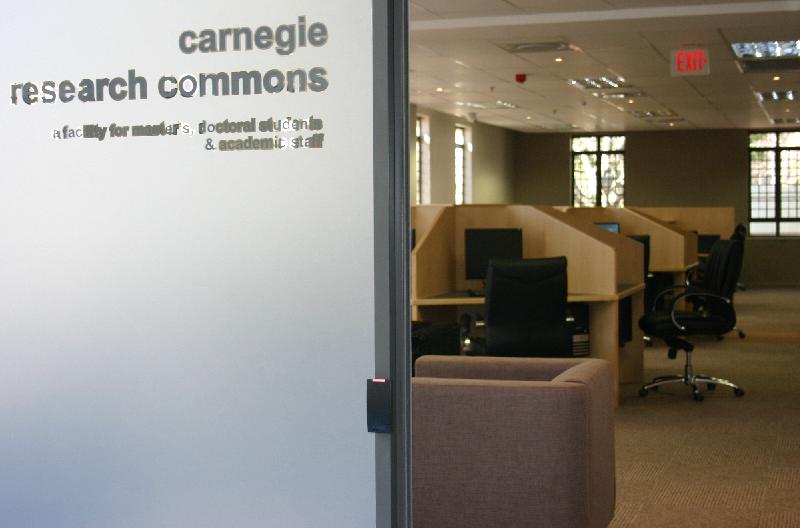
When the new Research Commons is opened at the Rhodes Library on 3 September by Dr Saleem Badat, it will represents not only an exciting new chapter in the University’s research history, but the near-perfect synergy of a number of decisions, visions and initiatives.
This new facility, with its state-of-the-art equipment and an ambience eminently suitable for the production of new knowledge, marks a significant step forward in the much-valued research agenda at Rhodes.
Made possible by a grant from the Carnegie Corporation of New York, United States of America, the Research Commons is intended to serve senior postgraduate students and staff, especially the emerging young cadre of high-level researchers who may not otherwise have access to such a space. The idea has been to create an environment that is supportive and conducive to producing quality research, to develop a community of practice that young researchers will aspire to join and will help to overcome feelings of loneliness and isolation.
The Research Commons is, according to Gwenda Thomas, Director of Library Services at Rhodes, part of a prestigious project involving six universities in South Africa, with Rhodes being selected as a partner in the second phase with a total grant of $2.m, along with Stellenbosch University and the University of Pretoria. They join UCT, Wits and UKZN who were part of the first phase, and it shows once again that Rhodes punches well above its weight in the research department.
The Rhodes Research Libraries’ Consortium Project, as it is known, involves three-year funding of over $300 000 from the Carnegie Corporation, which aims to strengthen and enhance academic library support for research and researchers. The funding provides for three initiatives, i.e. the Research Commons as described above, training opportunities to strengthen the capacity in research librarianship, and the implementation of a portal that will use advanced discovery search tool software to access online information resources.
The portal, known as PRIMO, is a kind of Google-on-steroids for academic research and will be launched alongside the Research Commons. This advanced research portal has discovery tools that will make it easier for researchers to find what is available, not only at Rhodes but also through open source and other repositories. It will be accessible through single sign-on via the top-end computing facilities in the Commons, consisting of 12 workstations and eight laptop computers.
The workstations have been arranged in a way that allows for different degrees of privacy and interaction, and the laptops will be available for loan. Fifteen senior postgraduate students will be employed as research navigators to assist after normal office hours and training will also be available for users, although the process is generally quite simple and intuitive.
The Research Commons will be staffed by professional librarians on a roster-basis and facilities for photocopying, scanning, charging laptops, etc. as well as a seminar room. Other features include a comfortable lounge area with the daily newspapers, a kitchenette, lockers for safekeeping of personal belongings and a display shelf for key research texts and South African research literature. The facility has a capacity of around 40 staff and students and will be access-controlled because it is a dedicated space. This is in line with the principles agreed to by the Consortium, so that all these facilities are operated in the same way across the different universities.
Librarians need to have specialist knowledge of how to support the research enterprise, especially in circumstances where school and undergraduate experiences have not promoted a strong information literacy orientation in students. To this end, some 16 Rhodes Library staff members have been selected to participate in national training workshops for the consortium partners, and four of these will be given the opportunity to participate in a 10-week internship in the USA, where they will immerse themselves in what a top-level research librarian does.
All these participants have been exposed to the full spectrum of activities and dynamics involved in the research process, in order to understand and provide relevant support for researchers. Prof Chrissie Boughey of CHERTL has provided valuable input in this regard.
Ms Thomas, explains how it all came together. “This is part of the enormous intrinsic value of the new library,” she says. If Rhodes had not embarked on the expansion and modernisation of the Library, the University probably would not have been considered for inclusion in the second phase of the Carnegie project, despite its research credentials.
But the combination of these two factors, together with the research graduate imperatives of the Dept of Science & Technology (through the NRF) and the support and vision of Dr Badat and the DVC for Research & Development, Dr Peter Clayton, has created the critical mass to make it all happen. Although most of the funding has been provided by Carnegie, the University has also made a fair-sized contribution to the Library’s Research Commons.
Representatives of the Carnegie Corporation of New York will not be present at the opening of the Research Commons, but will visit the facility next year as part of their special 100th-year celebration.
